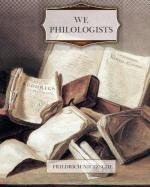In addition to this, a more gentle spirit has become widespread, thanks to the period of illumination which has weakened mankind—but this weakness, when turned into morality, leads to good results and honours us. Man has now a great deal of freedom: it is his own fault if he does not make more use of it than he does; the fanaticism of opinions has become much milder. Finally, that we would much rather live in the present age than in any other is due to science, and certainly no other race in the history of mankind has had such a wide choice of noble enjoyments as ours—even if our race has not the palate and stomach to experience a great deal of joy. But one can live comfortably amid all this “freedom” only when one merely understands it and does not wish to participate in it—that is the modern crux. The participants appear to be less attractive than ever . how stupid they must be!
Thus the danger arises that knowledge may avenge itself on us, just as ignorance avenged itself on us during the Middle Ages. It is all over with those religions which place their trust in gods, Providences, rational orders of the universe, miracles, and sacraments, as is also the case with certain types of holy lives, such as ascetics; for we only too easily conclude that such people are the effects of sickness and an aberrant brain. There is no doubt that the contrast between a pure, incorporeal soul and a body has been almost set aside. Who now believes in the immortality of the soul! Everything connected with blessedness or damnation, which was based upon certain erroneous physiological assumptions, falls to the ground as soon as these assumptions are recognised to be errors. Our scientific assumptions admit just as much of an interpretation and utilisation in favour of a besotting philistinism—yea, in favour of bestiality—as also in favour of “blessedness” and soul-inspiration. As compared with all previous ages, we are now standing on a new foundation, so that something may still be expected from the human race.
As regards culture, we have hitherto been acquainted with only one complete form of it, i.e., the city-culture of the Greeks, based as it was on their mythical and social foundations; and one incomplete form, the Roman, which acted as an adornment of life, derived from the Greek. Now all these bases, the mythical and the politico-social, have changed; our alleged culture has no stability, because it has been erected upon insecure conditions and opinions which are even now almost ready to collapse.—When we thoroughly grasp Greek culture, then, we see that it is all over with it. The philologist is thus a great sceptic in the present conditions of our culture and training . that is his mission. Happy is he if, like Wagner and Schopenhauer, he has a dim presentiment of those auspicious powers amid which a new culture is stirring.
169
Those who say: “But antiquity nevertheless remains as a subject of consideration for pure science, even though all its educational purposes may be disowned,” must be answered by the words, What is pure science here! Actions and characteristics must be judged; and those who judge them must stand above them: so you must first devote your attention to overcoming antiquity. If you do not do that, your science is not pure, but impure and limited . as may now be perceived.




